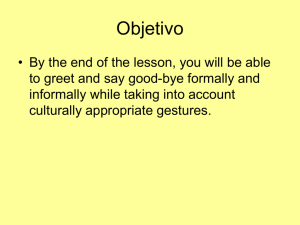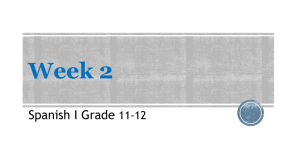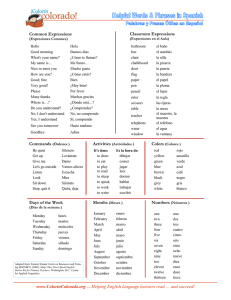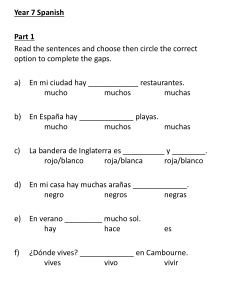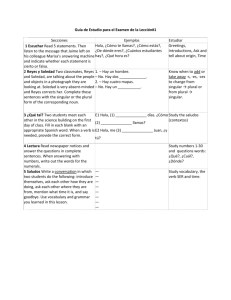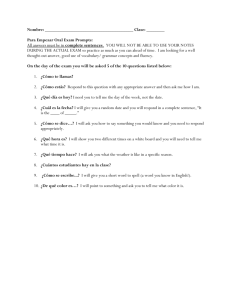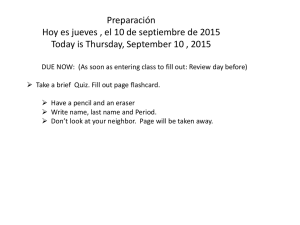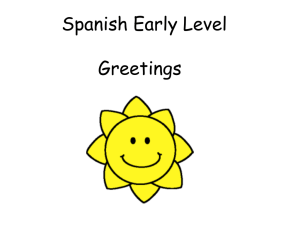Spanish 1
advertisement
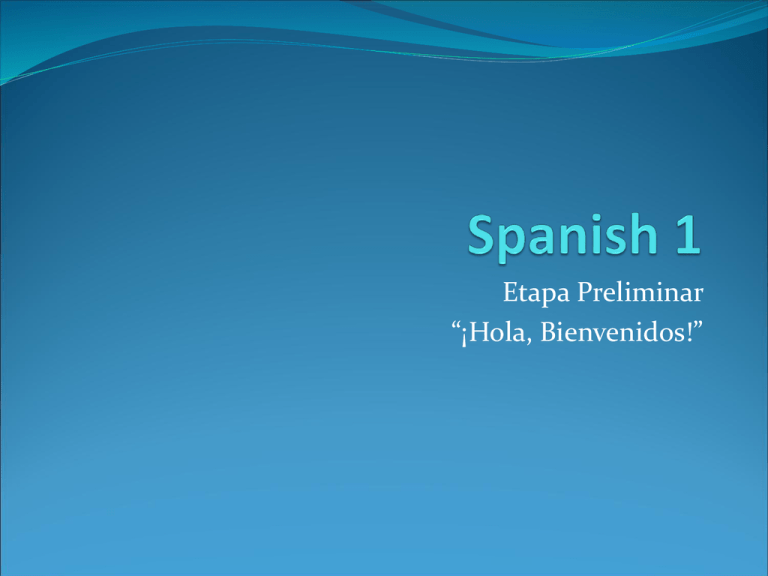
Etapa Preliminar “¡Hola, Bienvenidos!” ¡Hola! - Common Greetings Greetings change depending on the time of the day. Hola: anytime 12 Buenos Dias: 6am-12pm Good Morning 6 Buenas Tardes: 12pm-6pm 12 Good Afternoon 6 Buenas Noches: 6pm-6am 12 Good Evening 6 Adiós Despedidas - Fairwells Adiós – Good-bye Hasta Mañana – Until Tomorrow Hasta Luego – Until Later Nos vemos – We’ll see each other soon. Use “hasta luego” and “nos vemos” if you expect to see the person later that day or in the near future. Practice Greetings Actividad 1 – Buenos Días How would you greet a friend at these times? 1. 8:00 pm •Buenas Noches. 2. 10:45 am •Buenos Días. 3. 2:00 pm •Buenas Tardes. 4. 8:30 am •Buenos Días. •Hola. 5. Anytime •Buenas Noches. 6. 9:00 pm Exchanging Names To ask someone’s name: ¿Cómo te llamas? (What’s your name?)(what do you call yourself?) To tell someone YOUR name: Me llamo _____ . (My name is…) (I call myself…) To ask someone else’s name: ¿Cómo se llama (el chico/la chica)? (What’s his/her name?) To tell someone another person’s name: Se llama _____ . (His/her name is…) Proper Responses It is proper to say it’s nice to meet someone after exchanging names. Here are some proper responses. Encantado(a)*. – (I’m) Delighted. Mucho gusto. – Nice to meet you. El gusto es mío. – The pleasure is mine. Es un placer. - It’s a pleasure. Igualmente. – Same here. (Equally) * Note: In Spanish, all nouns have either a masculine or feminine gender. Masculine nouns usually end in -0 and feminine nouns usually end in – a. Since you are talking about yourself, make sure the word “encantado” agrees with your gender. (Boys say encantado. Girls say encantada.) Actividad 7 - ¿Cómo se llama? To a classmate: Greet them. Introduce yourself & find out their name. Give a polite response. Point to two others and find out their name. Say good-bye. Saying Where You Are From To ask where someone is from: ¿De dónde eres? (Where are you from?) To say where you are from: Soy de … (I’m from …) To ask where another person is from: ¿De dónde es (name)? (Where is he/she from?) To say where another person is from: Es de … (He or she is from…) Actividad 8 - ¿De dónde es? Tell where your new friends are from. Modelo – Tomas: España ¿De dónde es Tomas? Tomas es de Espana. El Abecedario (El Alfabeto) A=a B = be C = ce D = de E=e F = efe G = ge H = hache I=i J = jota K = ka L = ele M = eme N = ene Ñ = eñe O=o P = pe Q = cu R = ere RR = erre S = ese T = te U=u V = ve W = doble ve X = equis Y = i griega Z = zeta In 1994, two letters (LL & CH) were actually removed from the Spanish Alphabet in order to comply with the universal Latin alphabetical order for dictionaries. El Abecedario (El Alfabeto) A B C D E F G H I J K L M N Ñ O P Q R RR S T U V W X Y Z In 1994, two letters (LL & CH) were actually removed from the Spanish Alphabet in order to comply with the universal Latin alphabetical order for dictionaries. Spelling Someone’s Name: Vocabulary note: First Name Nombre Last Name Apellido To ask how to spell someone’s name: ¿Cómo se escribe tu nombre? To tell someone how to spell your name: Se escribe con… Example: ¿Como se escribe tu nombre, Juan? Se escribe con J-U-A-N. Los Numeros de Cero a Diez 0 = cero 1 = uno 2 = dos 3 = tres 4 = cuatro 5 = cinco 6 = sies 7 = siete 8 = ocho To ask someone’s phone number: ¿Cuál es tu teléfono? To tell someone your phone number: Mi teléfono es… 9 = nueve 10 = diez Días de la Semana Vocabulary: Monday = lunes Friday = viernes Day = el día Tuesday = martes Saturday = sabado Week = la semana Wednesday = Sunday = domingo Month = el mes miercoles Thursday = jueves Today = hoy Tomorrow = mañana •In Spanish, the days of the week are NOT capitalized. •The calendar week starts on Monday. •Finding out the day: • ¿Qué día es hoy/mañana? (What day is today/tomorrow?) •Telling the day: •Hoy es… (Today is…) •Mañana es… (Tomorrow is…) Canta! Think of the tune to the Adam’s Family. We’re going to break the rules and start with “Sunday” as the first day of the week. (Even though the Spanish week starts on Monday) Lyrics: Day’s of the Week (snap snap) - 2x Day’s of the Week - 3x There’s domingo and there’s lunes martes and miercoles jueves and viernes And then there’s sabado! Day’s of the Week (snap snap) - 2x Day’s of the Week - 3x Frases Útiles In the Classroom Abran los libros. Cierren los libros. Escriban… Escuchen… Lean… Levanten la mano. Miren el pizarrón. Pásenme la tarea. Repitan. Saquen un lápiz. Siéntense. (Open your books.) (Close your books.) (Write) (Listen [to]…) (Read…) (Raise your hand.) (Look at the chalkboard.) (Pass in the homework.) (Repeat.) (Take out a pencil.) (Sit down.) Frases Útiles Helpful Spanish Phrases ¿Cómo se dice..? ¿Qué quiere decir…? ¿Qué significa…? Mas despacio, por favor. No se. Repita, por favor. Tengo una pregunta. ¿Puedo ir a tomar agua? ¿Puedo ir al baño? ¿Puedo ir a la biblioteca? (How do you say…?) (What does this say..?) – (What does … mean?) – (More slowly, please.) (I don’t know.) (Repeat, please.) (I have a question.) (May I go get a drink of water?) (May I go to the bathroom?) (May I go to the library?) Frases Útiles In the text Cambien de papel. (Change roles.) Completa la conversación. (Complete the conversation.) Contesta las preguntas. (Answer the questions.) Di quien habla. (Say who is speaking.) ¿Es cierto o falso? (True or False?) Escoge la respuesta correcta. (Choose the correct response.) “” la palabra “” “” “” word.) “” la frase “” “” “” phrase.) “” la oración “” “” “” sentence.) Escucha… (Listen to…) Explica… (Explain…) Lee… (Read…) Pregúntale a otro(a) estudiante. (Ask another student…) Trabaja con otro(a) estudiante. (Work with another student…) Trabaja en un grupo de… (Work in a group of…)
